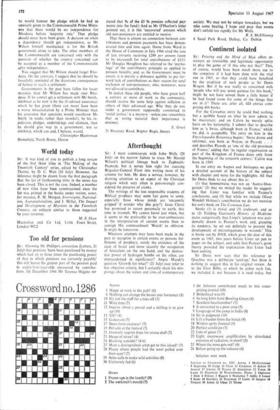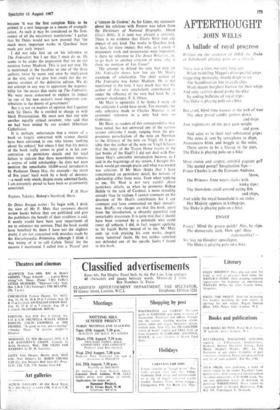Continent isolated
Sir: Printing and the Mind of Man offers re- viewers an irresistible and legitimate opportunity to play the game of 'if this why not that?' This, of course, would have been much more use to the compilers if it had been done with the trial run in 1963, so that they could have benefited by the erudition of such people as Sir Denis Brogan. But if he was really so concerned with 'people who will pay seven guineas for this book,' might he not have served them a little better if he had found room for some of the things that are in it? There are, after all, 424 entries com- prising 466 books.
For the Cervantes entry he could find nothing but a quibble based on what he now admits to be inaccuracy; and on Calvin he merely splits hairs on his nationality. I submit that to describe him as 'a Swiss, although born in France,' which we did, is acceptable. The entry on him in the Encyclopaedia Britannica begins: 'Swiss divine and reformer, was born at Noyon, in Picardy . . and describes Picardy as 'one of the old provinces of France,' adding that 'its regular organisation as part of the Kingdom of France dates only from the beginning of the sixteenth century.' Calvin was born in 1509.
In our entry on Asepsis and Antisepsis we give a detailed account of the history of the subject with chapter and verse for the highlights. All that Sir Denis finds to say about this is: (1) that Senunelweiss was not an 'Austro-Hun- garian,' (2) that we misled the reader by suggest- ing that Lister was familiar with Pasteur's conclusions, and (3) that while we include Oliver Wendell Holmes's contribution we do not mention his son's book on The Common Law.
Surely (I) is trivial and (3) irrelevant, and as to (2) Fielding Garrison's History of Medicine states categorically that Lister's 'attention was acci- dentally drawn to Pasteur's work and, grasping its tendency, he set out definitely to prevent the development of microorganisms in wounds.' This is borne out by DNB, which gives the date of this event as 1865, two years before Lister set pen to paper on the subject, and adds that Pasteur's germ theory provided the explanation that Lister had been seeking.
Sir Denis now says that his reference to Quechua was a deliberate `send-up,' but there is nothing to suggest this in his original review. As to the Eliot Bible, at which he pokes such fun, we included it, not because it is read today, but
because 'it was the first complete Bible to be printed in a new language as a means of evangeli- sation. As such it may be considered as the fore- runner of all the missionary translations.' I gather that Sir Denis would not now pretend that 'the much more important works in Quechua' have made any such impact.
I did not take him up on his reference to The Federalist; but I see that I must do so. He seems to be under the impression that we do not mention James Madison. This is just not true. He is mentioned in the headline as one of the three authors, twice by name and once by implication in the text, and we give him credit for the ex- tensive revision of the definitive edition. We d3 not attempt in any way to apportion the responsi- bility for the essays that make up The Federalist. We were more concerned to explain its impact 'as one of the new nation's most important con- tributions to the theory of government.'
But it is not on matters of opinion that I quarrel with Sir Denis. He is entitled to charge us with black Protestantism. He must sort that out with another equally critical reviewer, who said that we had been misled by our evident Hibernian Catholicism.
It is, perhaps, unfortunate that a review of a book so largely concerned with science should have been entrusted to one who knows 'nothing about the subject,' but where I feel that his notice of the book really comes to grief is in his con- centration on pernickety details and his total failure to indicate that there nevertheless remains a corpus of solid scholarship—he does not even mention the remarkable 10,000-word introduction by Professor Denys Hay, for example—the result of five years' hard work by a body of devotees —a result with which, despite many admitted faults, I am extremely proud to have been so prominently associated.































 Previous page
Previous page